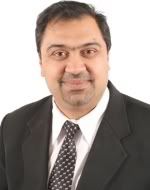Russia Vs. The US: No Contest
 The men's room library yielded an interesting story today from the Orange County Business Journal, detailing the toothpaste king career of one Puneet Nanda, whose OC-based company, Dr. Fresh, Inc., makes more than a billion yards of dental floss and 30 million toothbrushes a year.
The men's room library yielded an interesting story today from the Orange County Business Journal, detailing the toothpaste king career of one Puneet Nanda, whose OC-based company, Dr. Fresh, Inc., makes more than a billion yards of dental floss and 30 million toothbrushes a year.It was not always so. An Indian-from-India, when he first wanted to stretch his entrepreneurial legs, he went to Russia. It's not really that surprising, when one considers the strong influence Russia had over India during the Cold War years.
Here's the story's recounting of Nanda's Russian experience:
Dr. Fresh started selling his toothbrushes to Russian traders who were looking for cheap consumer products to sell back home. He said they started stopping by his factory every week. Nanda learned Russian and even hired a chef to cook Russian food for his visitors, he said.He fled to New York, which was tough, too -- no beatings or shootings, but a real drudge. One day, laying on his back on the sidewalk after slipping on ice, he thought about warmer climates and decided Miami sounded nice. The flight to Miami was cancelled, though, so he headed to the only other warm city he new of in the US, Los Angeles.
In 1993, at age 25, Dr. Fresh opened an office in Moscow, leaving his relatives to run the business in India. He was young and fearless.
“I just wanted to break out and experience something different,” he said. “India was the only thing I knew. It was a real adventure for me.”
Dr. Fresh’s first day in Moscow wasn’t what Nanda expected.
Police approached him when he walked out of the airport, he said. When he didn’t have the stamp they were looking for on his passport, he said they took him to jail. After hours of pleading and $20, he said the Russian guards released him.
Nanda had friends in Russia, he said, which helped him adjust to life there.
He said he scraped by with the little money he had. He shared an apartment with an old Russian woman and survived on boiled potatoes and salt when stores ran out of food.
“Let’s just say it was a humble beginning,” Nanda said.
He networked with buyers and eventually grew his business to 45 workers.
In Moscow, some days were great. He said he couldn’t import toothbrushes fast enough to meet demand.
Other days weren’t so hot. Like when the mafia came to his office to collect a “tax,” or the time he was mugged and beaten at a subway station, he said.
Three years into his stay, the bad started to outweigh the good, Nanda said.
Renegade mobsters robbed him, he said. They shot him in the head and cut off an employee’s hand, according to Nanda. He survived but fled the country afterward.
Here's his US experience:
He said he bought a used computer and a mobile phone and spent three months in a motel off Pioneer Boulevard making cold calls to buyers. He went to Wal-Mart, Walgreens, Target and other stores. He tinkered with his own ideas and thought of products he could make.Stunning, isn't it, what the great American tradition of immigration and American-dream-hunting can accomplish?
“I wanted to know what companies were making and what these stores were buying from them,” Nanda said. “It was inspiration for me, I wanted to do better.”
He scored his first big U.S. deal selling 180,000 toothbrush six-packs to City of Commerce-based 99 Cents Only Stores.That opened doors with buyers at Wal-Mart, Walgreens, Target and other stores. ...
Within a few years Nanda said he was looking for office and warehouse space in Orange County. At his Buena Park office, he continues to invent products and meet with buyers.
Last month, Dr. Fresh was a finalist for the 2007 Ernst & Young Entrepreneur of the Year Award.
Nanda said he’s planning to take his company public in 2009 and is working with consultants. The goal is to grow the company to $100 million in yearly sales within a few years, he said.
And it's not just the comparisons of the Russian and American approaches to business that are stunning. The story also screams out about the difference between immigrants who come here with a commitment to our country's system and the benefits it can provide over a lifetime, and those who sneak across the border for no other reason than to send money home.
Nanda has contributed as much to America has he has gotten from it, providing jobs, paying taxes and providing consumers with products they like. Jose the gardener provides consumers with a service they like (but likely not as much as they liked the services of their old American gardener), and that's pretty much it. Maybe he pays some taxes, but he takes much more in services than he gives.
Add the lessons of this story to your list of why immigration reform will be good for America.
Labels: Immigration




<< Home